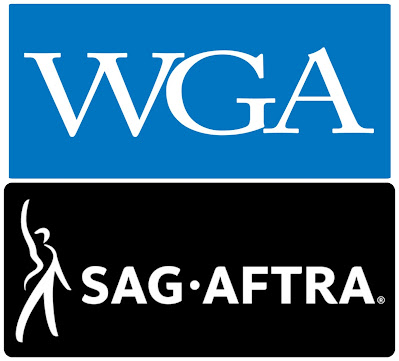
The
SAG-AFTRA and
WGA strikes are officially over as of
Thursday, Nov. 9 (though the WGA was able to end there’s earlier). I can’t tell
you just how excited we here at Trust the Dice are to get back to our regularly
scheduled reviews and streams – though we may be altering the latter just a bit
(we’ll discuss that at a later date).
Let’s talk about the strikes, for just a moment longer.
It only occurred to me recently that the biggest sticking
point for actors and writers wasn’t common knowledge. People thought it just
boiled down to royalties. While that was an issue, it was not the biggest among
them. In fact, I’d say it was the least important issue they were fighting for
overall. There were issues they fought for that affect everyone, even those not
in Hollywood.
The easiest agreements that fell among the most important of
them, involved things like sexual harassment prevention, young actors
continuing schooling, and closer monitoring of animal actors to protect
everyone on set. There were agreements on those issues made all the way back in
July.
Then there were issues of inclusion. It came out during the
strike that, often, services on sets were only provided for white actors.
Things like hair and makeup were rarely provided for other races. I’ve heard a
lot of arguments about how the big actors should be able to take on that kind
of fee, but even if they could, that kind of exclusion is objectively wrong. For
that kind of racism to prevail in this day, is ridiculous. The fact that the AMPTP
argued with altering it, for any length of time, is disgusting.
Finally, there was one sticking point that made it so that
no writer or actor could even think of going back to work without resolving. It’s
an item that could have set a Black Mirror-esk precedent for all of us. That
issue was artificial intelligence.
The AMPTP refused to give an inch during the strikes on
anything AI related, but it was such an important issue that no creative would
dare think of ending negotiations without resolving it.
Writers were fighting for AI to be unusable for writing, or
rewriting, their material. This means they were fighting for the right to their
own work. The way AI works, any script written by it would be a Frankenstein of
other writers’ projects. Any writing used to train AI would be up for grabs in
those projects and would have led to rampant plagiarism. The hard work writers
created could have been taken and used to form other creations without any
compensation or credit.
As a writer, I’m glad the guild stuck it out and gave no
inch where AI was concerned.
Yet, I feel like what actors were fighting for was even more
important.
The studios wanted to be able to take a scan of actors, pay
them a (very low) one-time fee and use their likeness in perpetuity – even after
their death. In fact, on some projects they had already
begun doing so. There
are reports of background actors having been scanned, and then told afterwards
that the scans would be used to make digital copies of them for future work.
Work they would have no credit or pay for.
How many cameras are placed all around us these days?
Traffic cameras, doorbell cameras, phones… there’s no doubt that each one of us
appears on video many times every single day. Now, the SAG/AFTRA deal doesn’t
affect laws, but it does offer precedent as to what people will tolerate. If
the actors had quit before securing the right to their own images, it would
have told politicians that the line for AI use was hazier than they thought.
Given the chance to use the likeness of citizens for free,
who knows what could have happened.
If you’re one of the people out there who thought these
strikes were just about making the rich richer, I hope you don’t think that
anymore. I hope you see how important these strikes were to all of us.
Congrats to the WGA and SAG/AFTRA on their new contracts! I’m
so very excited to get back to promoting your films.
